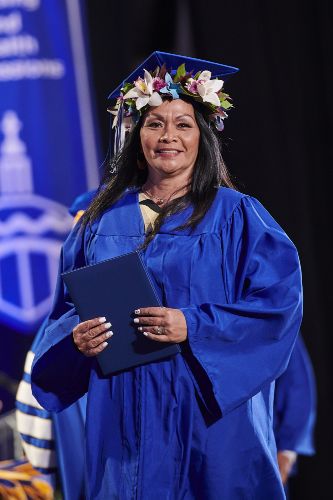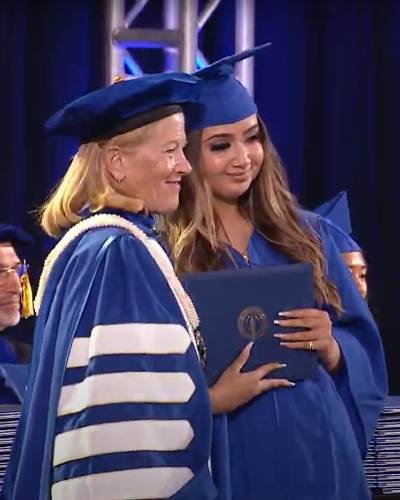Alumna sifts through databases to produce Hawaii’s Uniform Crime Reporting

For most of us, a dashboard primarily indicates a vehicle’s rate of speed, RPMs, engine temperature, gas gauge, mileage and maybe even a personal playlist. However, for Zoey Kaneakua ’22, an instrument panel means something completely different. A 2022 Chaminade University alumna with a degree in Data Science, Analytics and Visualization (DSAV), the 22-year-old Kauai native implements dashboards to measure crime statistics in Hawaii.
“In my sophomore year, I considered leaving Chaminade because I wasn’t enjoying my choice of major,” recalls Kaneakua, a recipient of the Ho‘oulu Scholarship, which is awarded to Native Hawaiian students pursuing a career in Science, Technology, Engineering and Mathematics (STEM). “Then my mom suggested that I major in data science, which I wasn’t sure about, but I’m glad I listened to her. She was right.”
In middle school, Kaneakua developed an interest in computer coding just so she could personalize her Tumblr profile. Data science, though, was not in her purview nor in her future. But forensics was, or so she thought. Now she’s a self-described “research geek,” who prefers math over the arts, and enjoys designing dashboards with custom colors and functions.
“I really grew an interest in juvenile justice and criminal justice data when I was at Chaminade,” Kaneakua asserts. “I wanted to use data science—using statistics and computer science—to make it more understandable, interactive and accessible to the public.”

Kaneakua was the ideal candidate for the Data Science program, which encourages students to work in grassroots and community organizations, a fundamental principle in the pedagogical approach at Chaminade, which the National Science Foundation (NSF) INCLUDES Alliance selected to lead a groundbreaking $10 million grant project aimed at creating new opportunities in STEM and data science careers for historically underrepresented populations across Hawai‘i and the Pacific Region.
“You can apply data science to every field—education, healthcare and mental health, environmental science and climate change, and criminal justice,” explains Dr. Rylan Chong, director of Chaminade’s Data Science program. “It’s not just about crunching numbers, but ensuring the numbers reflect different viewpoints and getting those numbers into the right hands.”
Sitting in front of two screens at her office in the Department of the Attorney General’s Crime Prevention and Justice Assistance Division, Kaneakua demonstrates how she monitors and reports crime statistics in Hawaii and then uploads the data to the Federal Bureau of Investigation’s National Incident-Based Reporting System (NIBRS), an incident-based reporting system in which law enforcement collects data on each crime occurrence.
“When I was in school, all my research was in criminal justice,” Kaneakua says. “And I was especially interested in looking at juvenile justice.”

Ironically, the crime reports that Kaneakua once poured over are now her kuleana (responsibility). She also now understands how there could be discrepancies in the numbers. Hired in September as a data analyst with the Crime Prevention and Justice Assistance Division, the former Silversword is now the point person, to whom police departments on Oahu, Maui, Hawaii Island and Kauai submit their monthly crime reports. Citing her education at Chaminade—and specifically her mentor Dr. Chong—as reasons for being in her current position, Kaneakua points out that she wasn’t even aware that this position was open.
“This was one of the hardest jobs to pursue because the state requires any new hires to have at least one-year experience,” Chong says. “In Zoey’s case, she needed at least one year of experience in both data science and criminal justice since she was filling the role of a database specialist and a data analyst.”
In her junior year, Kaneakua joined aspiring data scientists from across Hawaii and the mainland to participate in Chaminade’s monthlong Supporting Pacific Indigenous Computing Excellence (SPICE) Data Science Summer Institute.
“That was my first independent research involving juvenile justice,” Kaneakua says. “And I think I built my first dashboard in three days using Python (a high-level, general-purpose programming language).”
For her next project, Kaneakua participated in C4C (Computing for Change), looking at domestic violence across the U.S., and trying to make sense of the data and its limitations. Today, she works on real-time projects, which allow her to use all the skills and knowledge that she learned and honed while attending Chaminade.
“None of this would have been possible without Rylan,” says Kaneakua in praise of Chong. “He believed in me and helped me navigate and find my niche. I am eternally grateful for this opportunity and I am proud to represent Chaminade’s DSAV program as I continue to conduct criminal justice research in Hawaii.”















